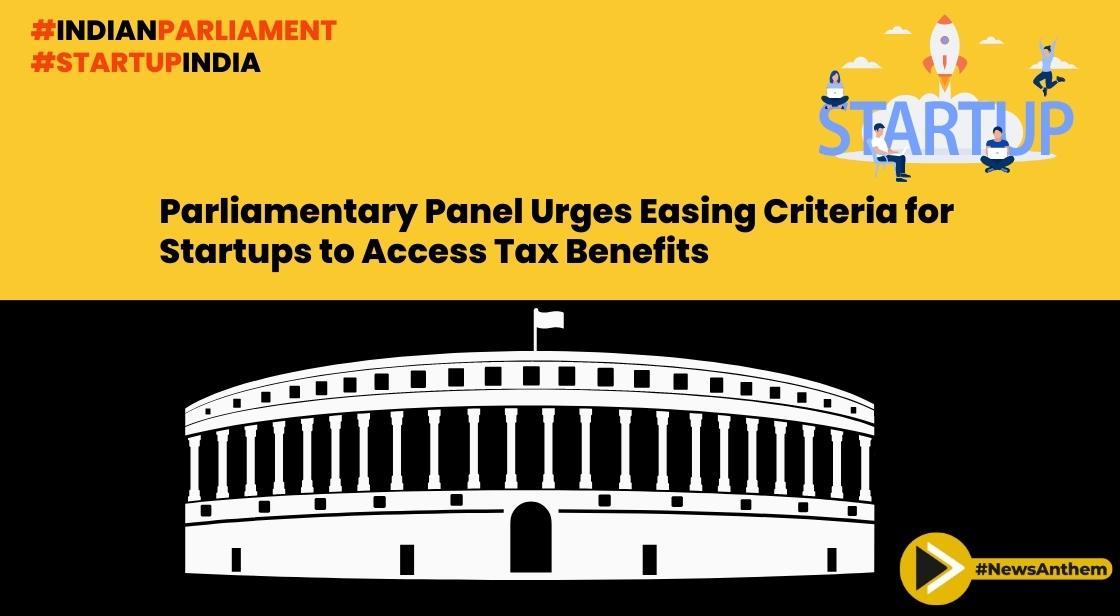Parliamentary Panel Urges Easing Criteria for Startups to Access Tax Benefits

News Synopsis
In a recent development, the Department-related standing parliamentary committee for commerce has put forth recommendations to relax the eligibility criteria for startups to avail of tax benefits under the income tax law.
The committee expressed concerns regarding the underutilization of Section 80-IAC of the Income Tax Act, 1961, which was initially introduced in 2017 to promote the growth of startups.
Under Section 80-IAC, startups are eligible to claim a deduction of up to Rs 100 crore in profits for three consecutive years. However, the committee highlighted that only a mere 10.4% of the 98,119 officially recognized startups in India have taken advantage of this exemption.
The report further reveals that as of March 31, 2023, a total of 1,173 applicants have been granted the Certificate of Eligibility required for availing these tax benefits.
In light of this, the committee expressed its concern, noting, "This means that even after six years of the implementation of Section 80-IAC of the Income Tax Act, 1961, only 1% of recognized startups have received the Certificate of Eligibility."
The committee has also pointed out a significant challenge in the application process, where 75% of the applications for the Certificate of Eligibility are returned for resubmission due to lack of clarity. To address this issue, the committee recommends enhancing the transparency and user-friendliness of the application process.
As part of its recommendations, the committee suggests that the government consider relaxing the eligibility criteria for issuing the Certificate of Eligibility. This, the committee believes, would enable more startups to avail the tax benefits provided by Section 80-IAC.
Another notable recommendation by the committee is to waive the requirement for startups to demonstrate three consecutive years of profitability to qualify for these benefits. This move aims to provide a more flexible framework for startups, acknowledging the challenges they often face in their initial years.
Moreover, the committee has proposed amendments to the Income Tax Act to enable startups to use Employee Stock Option Plans (ESOPs) as an attractive compensation model for their employees, particularly those with lower salaries.
In this context, the committee suggests taxing ESOPs only at the point of share sale, rather than taxing notional gains.
In addition to these recommendations, the committee emphasizes the importance of establishing a comprehensive database containing information about all startups operating within the country.
This database would facilitate better tracking and support for startups across various stages of their development.
Furthermore, the committee advocates for a more relaxed regulatory framework for unlisted domestic companies, allowing them to directly list on foreign stock exchanges, thereby promoting greater access to global capital markets.
Some relevant and latest facts for the above news:
-
As of March 31, 2023, only 1,173 out of the 98,119 recognised startups in India have been granted a Certificate of Eligibility for tax exemption under Section 80-IAC of the Income Tax Act.
-
This means that only 1.2% of recognised startups have availed of the tax benefits available under Section 80-IAC.
-
The parliamentary panel has recommended that the government should work towards making the application process for tax exemption under Section 80-IAC more transparent and user-friendly.
-
The panel has also recommended that the requirement for startups to be profit-making for three consecutive years be waived.
-
This would make it easier for startups to avail of the tax benefits available under Section 80-IAC, and would help to boost the startup ecosystem in India.
The parliamentary panel's recommendations are timely and important, as they would help to address some of the key challenges that startups face in India.
By making the application process for tax exemption more transparent and user-friendly, and by waiving the requirement for startups to be profit-making for three consecutive years, the government can help to create a more conducive environment for startups to grow and succeed.
Here are some additional facts that you may find relevant:
-
The Indian startup ecosystem has grown significantly in recent years, with the number of startups increasing from 3,100 in 2014 to 98,119 in 2023.
-
The startup sector is expected to contribute $1 trillion to the Indian economy by 2025.
-
However, startups in India face a number of challenges, including access to capital, talent, and infrastructure.
-
The parliamentary panel's recommendations are a step in the right direction to address these challenges and to create a more conducive environment for startups to grow and succeed.









